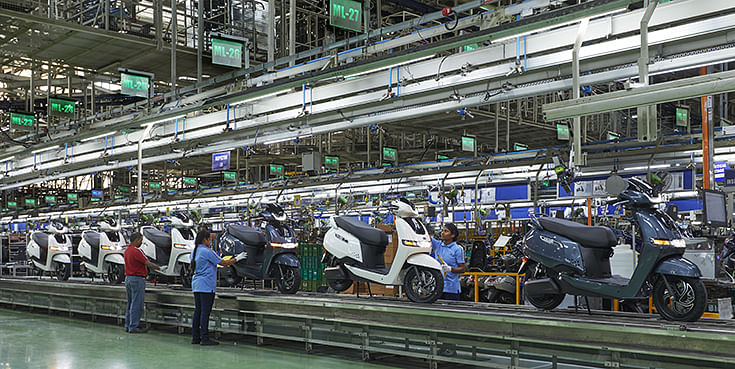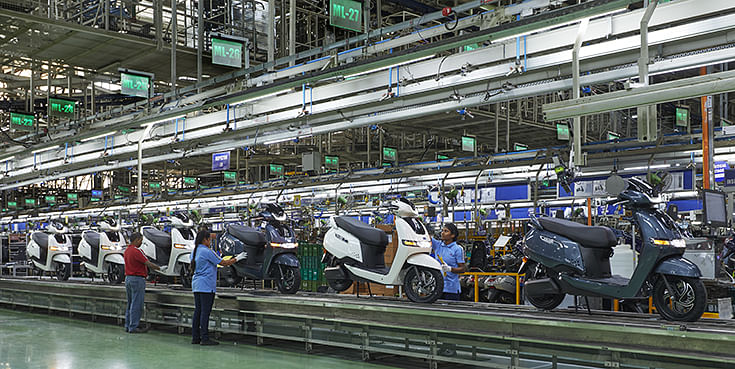TVS Motor Co, which has topped the electric two-wheeler market for the last four months running, is looking to up the ante for its iQube electric scooter. One of the strategic moves is to target growing demand for scooterisation in rural India with its zero-emission scooter.
Renewed consumer activity in rural India as a result of the ongoing abundant monsoon season this year, which will accrue in higher income for this key sector and revive rural spending power, would be among the reasons for TVS planning to expand its target market for the iQube.
What will also help is the reduction in the repo rate by 50 basis points in June, which will translate into a higher level of retail financing even in rural India.
In Q1 FY2026, TVS Motor, which manufactured a total of 68,512 iQubes (up 39% YoY) between April-June 2025, dispatched 69,490 units (up 41% YoY) to its dealers in the domestic market and also exported 544 units (up 353% YoY).
On the retail sales front, the company delivered 70,215 iQubes to customers in Q1 FY2026, marking 109% YoY growth (Q1 FY2025: 33,656 units).
Like most other electric two-wheeler manufacturers, including No. 2 e-2W OEM Bajaj Auto, the TVS iQube’s sales have been concentrated in urban India and the bulk of the 900-strong dealer network is located in urban and semi-urban India.
Growing level of scooterisation in rural India
Now, in an effort to widen its target audience and also expand its reach across the country, TVS Motor Co plans to address the vast rural India market, which is a major buyer of fuel-sipping commuter motorcycles and scooters.
Speaking in an analyst conference call following the announcement of the company’s Q1 FY2026 results on July 31, K N Radhakrishnan, director and CEO, TVS Motor Co, said: “The EV penetration of the two-wheeler industry is at 6.3 percent. The TVS iQube has done pretty well, and it has surpassed 600,000 unit sales, continuing its market leadership in India so far. We have launched new variants of the TVS iQube with 3.1 kWh battery that offers very good range. With this, the TVS iQube portfolio now offers an array of six variants, making this one of the widest and most compelling products in this segment.”
“When we started the iQube journey, we saw people want to try something new. But now most customers, who are otherwise ICE customers, want to look at EV as an alternative. They are also seeing progressive improvement in the TCO. They feel that iQube is also like an ICE product – I always believe that customers are agnostic to technology. They want to use it like a normal scooter, two people can travel comfortably, good roads, bad roads, rains. That is the reason iQube is one of the prominent players in the EV category. And predominantly, this was in urban.”
He added, “Slowly now, it is getting into rural which is pretty good news. Slowly now, we will start getting into rural – semi-urban and rural. Today, it is predominantly urban, because there may be some people who may buying in the cities and they may be taking it to the rural.”
TVS aims to bank on the growing demand for scooters in rural India, which is a result of speedier infrastructure development and in turn better roads. While it is still early days for rural India to become a key buyer of electric two-wheelers, TVS clearly wants to be a first-mover in this space.
 The iQube production lne.
The iQube production lne.
Working on solutions to address shortage of rare earth magnets
As is known, the Indian EV industry is currently witnessing a crisis in the form of supply of rare earth magnets from the major supplier country, China. Rare earth magnets are used in a plethora of operations including electric vehicle motors, power steering systems, generator magnets, dashboard displays, and LED lighting systems, among other relevant components in the EV ecosystem.
Commenting on how TVS is addressing the issue of availability of rare earth magnets, KN Radhakrishna said in the con-call: “We are trying to mitigate it. There are challenges in the short term but we are also working along with a certain long-term action and are looking at various alternatives at this point of time.”
“Short term, we are managing with the stocks what we have. We also resized some higher-sized magnets, which are locally available. We are also exploring some alternate strategies in the short term? On a medium- and a long-term basis, we are working on HRE-free, ferrite-based, magnet-free, and we are also looking at alternate countries. And definitely, we’ll be also working partnering with some of them in India. We have to build forward a more resilient company and a country on magnets.”
